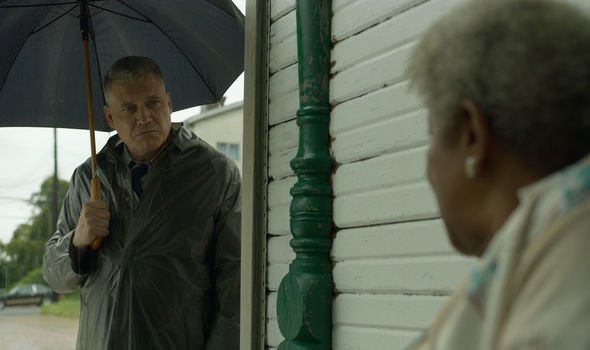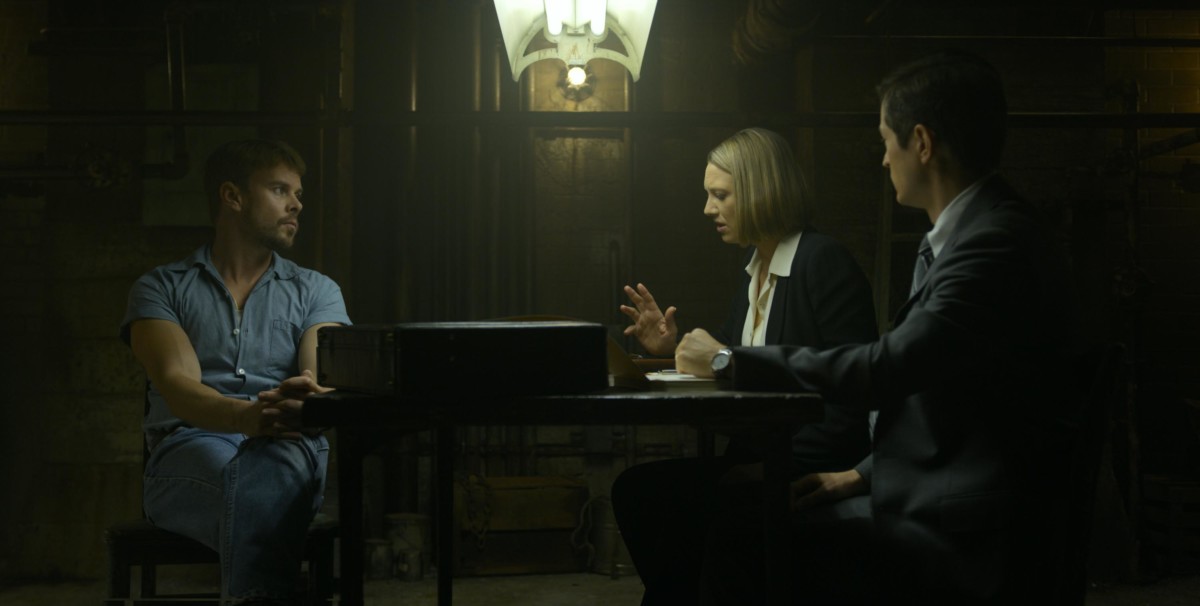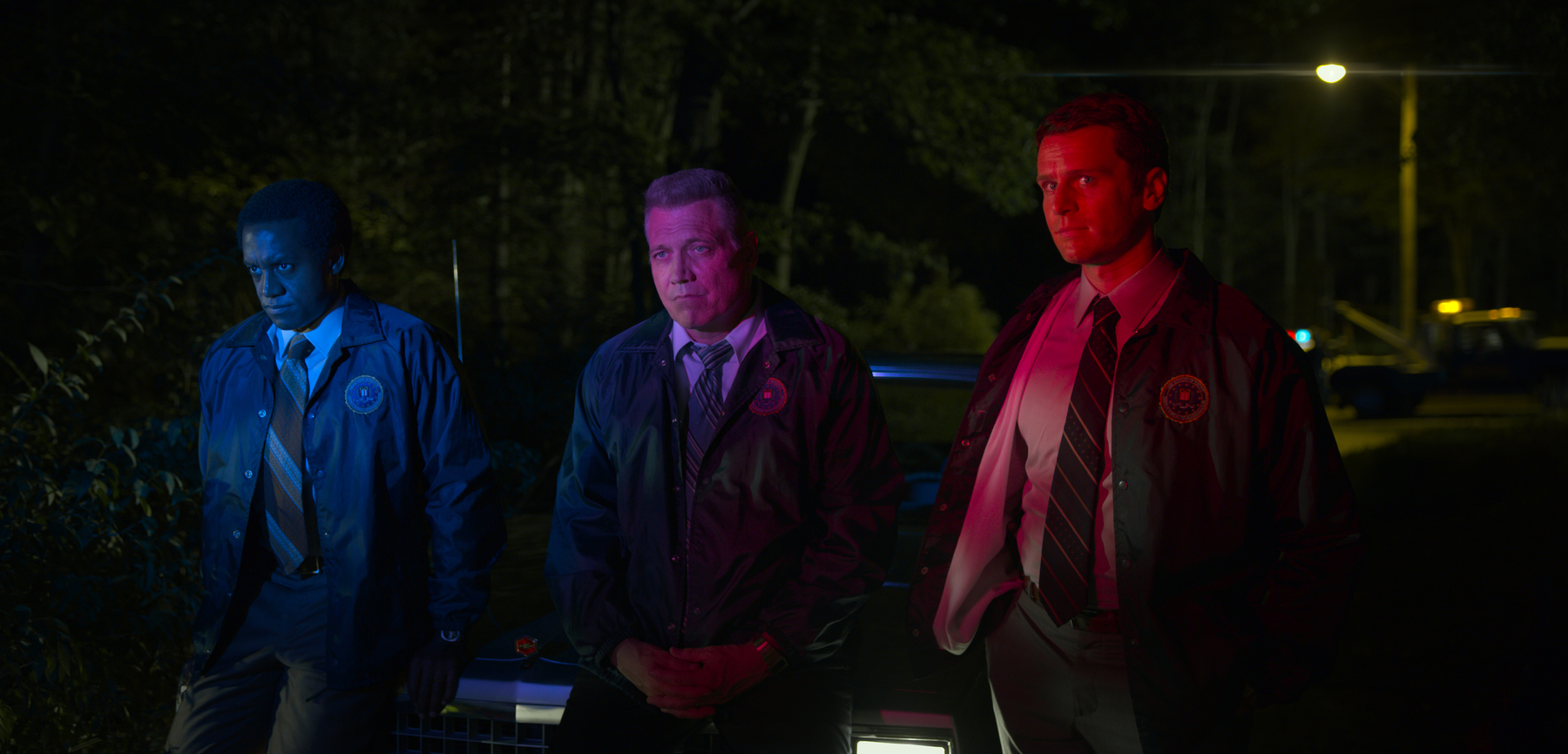We take a lot of things for granted in the realm of entertainment. A series about interviews with serial killers which are then used to bring the ones still at large to justice, from a brilliant mind like David Fincher, certainly tops the list. Based off of the real F.B.I. Behavioral Science Unit that surfaced in the late 1970s, Mindhunter’s first season introduced us to Holden Ford (Jonathan Groff), Bill Tench (Holt McCallany), and Wendy Carr (Anna Torv) as they formed the unit and began to map out their important and groundbreaking work into studying criminal behavior, specifically of those accused of multiple murders.

Season two casts an introspective light on the three leads, digging into their psyches and their own sense of self-importance, making them just as engaging as the killers they interview. Holden, fresh out of the hospital after suffering a panic attack, is eager to jump back into work. This time around he’s paired with Agent Jim Barney (Albert Jones) down in Atlanta, but Holden finds the subjects down south to be a bit underwhelming. He considers their cases to be beneath him due to their low IQs, and his disinterest is obvious to anyone who listens to the recordings.
The rest of the unit is visibly annoyed by Holden’s brashness and arrogance, making some of the best moments of the season be whenever the hotshot gets put in his place. Holden is unable to glean anything worthwhile from the Atlanta subjects, but Jim does, succeeding where he failed. Holden is only interested in those he considers to be smart, methodical killers, and usually that goes hand in hand with them being famous. It’s why he foams at the mouth at the opportunity to interview Charles Manson (Damon Herriman), someone who’s never actually killed anyone himself, but is bored when it’s time to talk to real murderers, solely because he doesn’t consider them to be bright. Jim, who still finds value in them, is a great addition to the cast this season, and a necessary one.

The unit gets involved with the Atlanta child murders, a string of real killings that occurred between 1979 and 1981, resulting in the death of 28 children. Holden sees this as the perfect opportunity to show how his work can result in arrests, but he’s unprepared for just how much the politics of a city unwilling to admit they have a predator can hinder his investigation. His profile of the killer, which he believes to be a black man in his late 20s/early 30s, is also not well received—the victims have all been black children, and the community is convinced that the Ku Klux Klan is the obvious cause. Holden is unable to grasp the difficulties of navigating through racial tensions, and he needs to learn if he’s going to have any success.
Holden’s frustration is only made worse by the fact that the mothers of the victims, who have been running their own investigation long before the police bothered to get involved, continuously pin their hopes on him only to be let down. Holden often struggles to fully empathize and see the victims of the crimes he studies as anything other than data, and the mothers are a constant reminder to him throughout the season of the very human toll these serial killers leave in their wake. His guilt at constantly failing to stop this particular killer is shown all over his face, and they make sure to not let him forget it.


Bill, meanwhile, is trapped between work and home. His job requires him to communicate and connect with the most difficult kinds of people, and he’s great at it, but completely unable to apply it at home. His relationship with his wife and son was already being stretched thin, but when a shocking incident strikes the family near the start of the season, the gap only widens. Bill is unable to get a word out of his son and is too scared of anything beyond small talk with his wife. It’s not that he’s unwilling, it’s that he doesn’t know how to when it’s this close and personal to him.
And yet, Bill is comfortable being the life of the party. The second anyone hears what his job is, they’re immediately enthralled; from F.B.I. higher-ups to his own son’s psychologist, it grabs the interest of everyone Bill meets, and he doesn’t seem to mind soaking up the attention it gets him. Unlike Holden, Bill is able to explain the work in layman’s terms, and make the stories truly entertaining. Both work and his family are important to him, but the struggle between the two whittle down his mental state until it finally bubbles over in a bad way during the Manson interview. Bill’s arc is the most interesting of the three this season, which unfortunately means that his life is currently the most tumultuous.


Bill has a choice to make between work and home, but Wendy seemingly has no choice at all. She puts herself out front and conducts a couple of interviews herself while Holden and Bill are off in Atlanta, and she does pretty well at it. She’s tired of working in the basement and wants to be more directly involved, but she’s too cautious to be good at asking for what she wants. The new assistant director, Gunn (Michael Cerveris), sidelines her halfway through the season, stopping her on her way up and there she remains for the remainder of the episodes.
Having Wendy have almost zero involvement with the main plot of season two, the Atlanta murders, can at times feel like a slight injustice to her character. It might also be exactly where she needs to be to at the start of season three. Wendy falls for a bartender named Kay (Lauren Glazier), and the two hit it off extremely well. Wendy is the happiest we’ve ever seen her, and Kay helps her learn how to put herself out there more, and be proud and confident in who she is. Wendy, a closeted lesbian, is fearful of coming out and asserting herself in her workplace, and rightfully so—the mixture of the two in that place and time would make anyone anxious.


It’s nice to see some well-written romance in this show about violent crimes that are often sexual in nature, and it’s a good reminder that Mindhunter, like the best episodes of any iteration of Law & Order, isn’t about the criminals—it’s about the people who investigate them. Season two is incredibly engaging television, and with the legwork of the first season out of the way, the show feels like it’s really gotten into a fantastic groove. It’s very much binge-watch material—you need to see how it all plays out.
Unlike the serial killers they speak to, Holden, Bill, and Wendy are seemingly unable to do any sort of self-assessment. Their egos and reluctance to admit mistakes no matter how much guilt they feel, and the need to be the smartest people in the room, are a recipe for disaster, especially when there are lives on the line. As the cases they’re involved with gain more media attention and the unit becomes more high profile, things will only get more complicated. Like the BTK killer that the show has been teasing in small segments since the start, they crave for and get off on the fame. And we can’t take our eyes off of it either.
Both seasons of Mindhunter are now streaming on Netflix.




